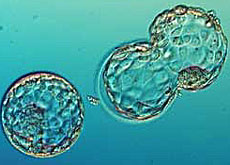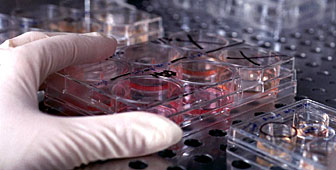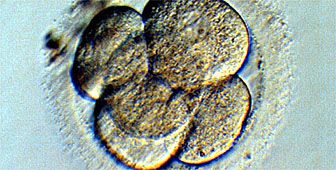Parliament backs stem cell research

The Senate has voted in favour of government proposals to allow research on stem cells from surplus human embryos.
But, as expected, it refused to give the go-ahead for research on the embryos themselves until a new law is formulated.
The proposals still need to be approved by the House of Representatives before they become law.
A Senate commission had already made changes to the draft legislation – distinguishing between stem cell research and research on human embryos.
The distinction is one which Denis Duboule, a professor of biology at the University of Geneva, says does not make a great deal of sense in scientific terms.
“An embryo is a collection of stem cells and therefore if you take an embryo and sort out the cells, you will have stem cells,” he told swissinfo.
“In other words you need to work with embryos to derive stem cells, and with a stem cell you can reconstruct an embryo.”
Government proposals
The Senate decided to allow the production of stem cells from surplus embryos up to seven days old – down from the government’s original proposal of 14 days.
But it rejected the creation of embryos purely for research purposes and banned cloning for the purpose of treating diseases.
Stem cells can only be derived from surplus embryos normally used for in-vitro fertilisation (IVF), which would otherwise be destroyed.
Consent of the couple whose fertilised egg cells are being used would also be required, as will proof that no other line of research can achieve the same ends.
For research to go ahead permission will need to be granted by either the Federal Office for Health or the ethics commission.
The importation of stem cells will be allowed but only under very strict conditions: researchers will need to be able to prove that the cells originated from surplus embryos. The use of stem cells and embryos for commercial purposes will be forbidden.
Women’s health
Research on human embryos is already having an impact on women’s health care, according to Joe Leigh Simpson, professor of obstetrics and gynaecology at Baylor School of Medicine in Houston, Texas.
He maintains that in IVF, the method of pre-implantation genetic diagnosis – or testing of an embryo to find out whether it is healthy and has the complete genetic make-up – has increased the success rate of IVF treatment and reduced the number of multiple births.
At the same time it has led to a drop in the rate of miscarriages among older women.
“The problem is that by simply looking at an embryo we cannot predict whether or not it is normal,” he told swissinfo.
“Apparently normal embryos can be genetically abnormal – and only by being able to test are we able to find out exactly what the situation is.”
Although pre-implantation genetic diagnosis is currently illegal in Switzerland, Duboule believes at some point in the near future it will be incorporated into Swiss law.
Ethical debate
The use of human embryos for research purposes has not only triggered a legal debate in Switzerland, it has also led to an examination of the moral issues involved.
Switzerland’s advisory commission on biomedical ethics was involved in deliberations as the government put together its proposals.
The main concern of the commission’s president, Christoph Rehmann-Sutter, was the protection of the “moral dignity” of human embryos.
“We must be clear about the reasons why we care about embryos ethically,” he said. “Embryos are significant morally because they belong to human embodiment.
“In a certain sense we must say that we have all been embryos at the beginning of our life.”
Duboule recognises the validity of the ethical debate surrounding research on human embryos, but maintains that within the next 15 years it will probably be a recognised form of research worldwide.
“I’m pretty convinced it’s going to be routine,” he said. “So it’s absolutely essential to have the proper legislation and legal tools to organise this research.”
swissinfo, Jonathan Summerton
The legislation will allow the production of stem cells from surplus embryos up to seven days old.
It does not allow research on embryos themselves.
Scientists can use stem cells from surplus embryos but not create embryos for their work.
Therapeutic cloning will be banned.
The consent of the couple whose fertilised egg cells are being used will be needed before stem cells from a surplus embryo can be used.

In compliance with the JTI standards
More: SWI swissinfo.ch certified by the Journalism Trust Initiative











You can find an overview of ongoing debates with our journalists here . Please join us!
If you want to start a conversation about a topic raised in this article or want to report factual errors, email us at english@swissinfo.ch.